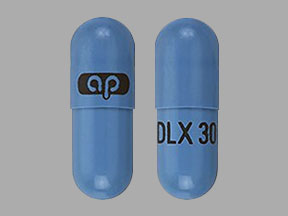Duloxetine and Alcohol/Food Interactions
There are 2 alcohol/food/lifestyle interactions with duloxetine.
Duloxetine Food/Lifestyle
Moderate Food Interaction
GENERALLY AVOID: Use of duloxetine in conjunction with chronic alcohol consumption may potentiate the risk of liver injury. Duloxetine alone can increase serum transaminase levels. In clinical trials, 0.3% of patients discontinued duloxetine due to liver transaminase elevations. The median time to detection was about two months. Three duloxetine-treated patients had liver injury as manifested by transaminase and bilirubin elevations, with evidence of obstruction. Substantial intercurrent ethanol use was present in each of these cases, which may have contributed to the abnormalities observed. Duloxetine does not appear to enhance the central nervous system effects of alcohol. When duloxetine and ethanol were administered several hours apart so that peak concentrations of each would coincide, duloxetine did not increase the impairment of mental and motor skills caused by alcohol.
MANAGEMENT: Due to the risk of liver injury, patients prescribed duloxetine should be counseled to avoid excessive use of alcohol. Duloxetine should generally not be prescribed to patients with substantial alcohol use.
References (1)
- (2004) "Product Information. Cymbalta (duloxetine)." Lilly, Eli and Company
Switch to consumer interaction data
Duloxetine High Blood Pressure (Hypertension)
Moderate Potential Hazard, Moderate plausibility
SNRI antidepressants - hypertension
Selective serotonin and norepinephrine reuptake inhibitor antidepressants (SNRIs) have been associated with sustained increases in blood pressure. Therapy with SNRI antidepressants should be administered cautiously in patients with preexisting hypertension. Blood pressure should be assessed prior to initiating treatment and monitored regularly. The dose should be reduced or discontinued if necessary.
References (5)
- (2001) "Product Information. Effexor (venlafaxine)." Wyeth-Ayerst Laboratories
- (2004) "Product Information. Cymbalta (duloxetine)." Lilly, Eli and Company
- (2008) "Product Information. Pristiq (desvenlafaxine)." Wyeth Laboratories
- (2009) "Product Information. Savella (milnacipran)." Forest Pharmaceuticals
- (2013) "Product Information. Fetzima (levomilnacipran)." Forest Pharmaceuticals
Switch to consumer interaction data
Duloxetine drug interactions
There are 635 drug interactions with duloxetine.
Duloxetine disease interactions
There are 10 disease interactions with duloxetine which include:
- liver disease
- renal disease
- depression
- diabetes
- glaucoma
- hypertension
- hyponatremia
- mania
- seizures
- urinary tract obstruction
More about duloxetine
- duloxetine consumer information
- Check interactions
- Compare alternatives
- Pricing & coupons
- Reviews (2,472)
- Drug images
- Side effects
- Dosage information
- Patient tips
- During pregnancy
- Support group
- Drug class: serotonin-norepinephrine reuptake inhibitors
- Breastfeeding
- En español
Related treatment guides
Drug Interaction Classification
| Highly clinically significant. Avoid combinations; the risk of the interaction outweighs the benefit. | |
| Moderately clinically significant. Usually avoid combinations; use it only under special circumstances. | |
| Minimally clinically significant. Minimize risk; assess risk and consider an alternative drug, take steps to circumvent the interaction risk and/or institute a monitoring plan. | |
| No interaction information available. |
See also:
Further information
Always consult your healthcare provider to ensure the information displayed on this page applies to your personal circumstances.


